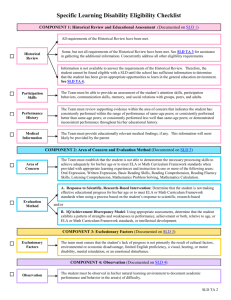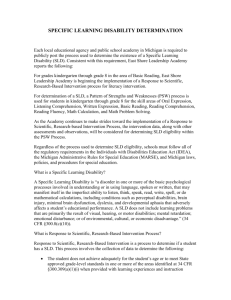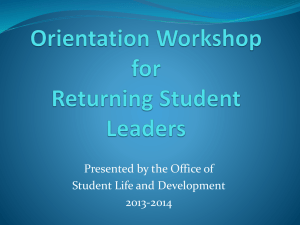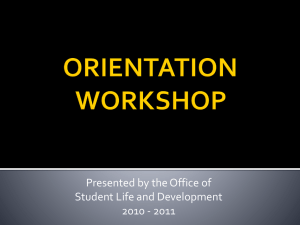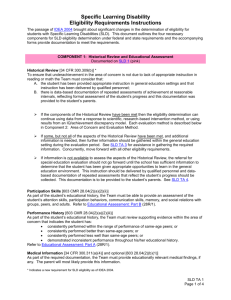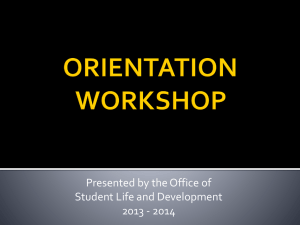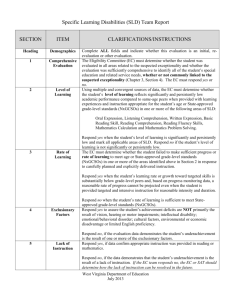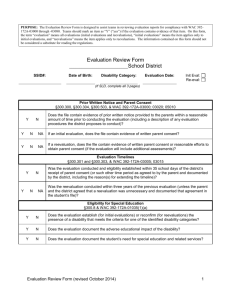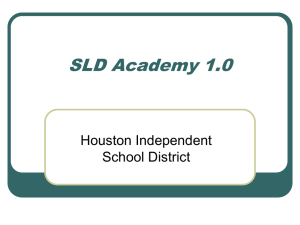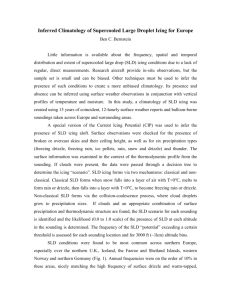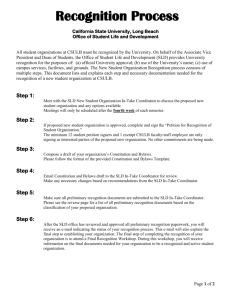Learning Disabilities and Special Education
advertisement
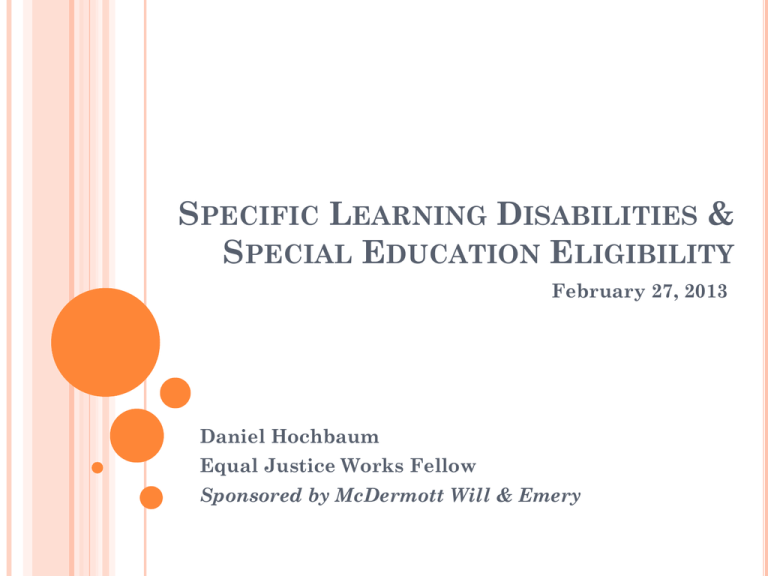
SPECIFIC LEARNING DISABILITIES & SPECIAL EDUCATION ELIGIBILITY February 27, 2013 Daniel Hochbaum Equal Justice Works Fellow Sponsored by McDermott Will & Emery Fellowship sponsor Has sponsored 8 two-year Equal Justice Works fellowships since 2005 in cities all across the US o Fellowship organizer o D.C.-based national organization that helps launch the next generation of public interest lawyers o Fellowship host organization o Federally mandated agency that protects the rights of people with disabilities in Illinois THE LD PROJECT Self Advocacy Assistance Community Outreach Institutional Knowledge Direct Representation 1. 2. 3. 4. Focus on: Initial eligibility Students in need of intensive interventions Returning to our clients WHAT IS SLD? DEFINING LEARNING DISABILITIES Forget about medical definitions Individuals with Disabilities Education Act (IDEA) Term: Specific Learning Disability Law: 34 C.F.R. § 300.8(c)(10) A disorder in one or more of the basic psychological processes involved in understanding or in using language, spoken or written… DEFINING LEARNING DISABILITIES …that may manifest itself in the imperfect ability to: Listen Think Speak Read Write Spell OR do mathematical calculations… …including conditions such as: perceptual disabilities brain injury minimal brain dysfunction Dyslexia AND developmental aphasia… DEFINING LEARNING DISABILITIES But wait! There’s more! DEFINING LEARNING DISABILITIES … LD does not include learning problems that are primarily the result of: visual, hearing, or motor disabilities mental retardation emotional disturbance or of environmental, cultural, or economic disadvantage 34 C.F.R. § 300.8(c)(10)(ii) WHICH METHODS ARE USED TO DETERMINE WHETHER A STUDENT HAS A SPECIFIC LEARNING DISABILITY? DETERMINING SLD: TWO* METHODS The Old(er)* Way: Severe Discrepancy A difference between ability and achievement Schools give IQ testing and Achievement testing and look for a gap States can determine how severe the discrepancy must be The New Way: Response to Intervention Three Tier Process (typically) Increasingly intense interventions at each tier Students are constantly screened and interventions are adjusted accordingly DETERMINING SLD: 34 C.F.R. § 300.307 Need state laws - Can’t force severe discrepancy - State criteria may not require use of severe discrepancy model in determining whether a child has an SLD Must allow RtI - Each state must adopt criteria for determining whether a child has an SLD as defined in IDEA State criteria must permit use of a process based on the child's response to scientific, research-based intervention (RtI) Other methods permitted - State criteria may permit use of other alternative research-based procedures EVALUATIONS Referral and Consent Timelines See § 300.309 Schools must comply with the timelines for evaluations in the statute Observations § 300.310 states that a child suspected of having SLD must be observed in the classroom as part of the evaluation School may use observation information from before the child was referred for an evaluation OR may observe after the referral WHO DETERMINES SLD? WHO DETERMINES SLD? 34 C.F.R. § 300.308 Determination of SLD is made by… Child’s Parents Child’s regular teacher At least one person qualified to conduct individual diagnostic examinations of children Such as… school psychologist speech-language pathologist remedial reading teacher HOW DO SCHOOLS DETERMINE WHETHER A STUDENT HAS A SPECIFIC LEARNING DISABILITY? DETERMINING SLD: 34 C.F.R. § 300.309 Factors Considered Child’s achievement levels in 1 (or more) of 8 specified areas Oral expression Listening comprehension Written expression Basic reading skill Reading fluency skills Reading comprehension Math calculation Math problem solving DETERMINING SLD: 34 C.F.R. § 300.309 Below age or grade level Child’s progress in 1 (or more) of these 8 areas is not sufficient to meet age or State-approved grade level standards when RtI is being used OR Pattern Child exhibits a pattern of strengths and weaknesses in performance, achievement, or both relative to: Age State-approved grade level standards, or intellectual development that group determines is relevant to identification of SLD… DETERMINING SLD: 34 C.F.R. § 300.309 But wait! There’s more! DETERMINING SLD: 34 C.F.R. § 300.309 o Group determines that being below age/grade level or that pattern is not primarily the result of: Visual, hearing, or motor disability Mental retardation Emotional disturbance Cultural factors Environmental or economic disadvantage Limited English proficiency DETERMINING SLD: 34 C.F.R. § 300.309 1 of 8 Factors Below age or grade level OR Pattern Not Primarily because of Other Causes consideration of whether the child did not receive appropriate instruction in reading or math consideration of data-based documentation of repeated assessments of achievement (and progress) at reasonable intervals SLD Eligibility! DOCUMENTATION OF ELIGIBILITY o o All of this information must be put into an eligibility determination document Each member of the team must state whether they agree with eligibility determination
